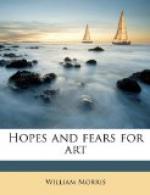Therefore, I say again, it is necessary to the further progress of civilisation that men should turn their thoughts to some means of limiting, and in the end of doing away with, degrading labour.
I do not think my words hitherto spoken have given you any occasion to think that I mean by this either hard or rough labour; I do not pity men much for their hardships, especially if they be accidental; not necessarily attached to one class or one condition, I mean. Nor do I think (I were crazy or dreaming else) that the work of the world can be carried on without rough labour; but I have seen enough of that to know that it need not be by any means degrading. To plough the earth, to cast the net, to fold the flock—these, and such as these, which are rough occupations enough, and which carry with them many hardships, are good enough for the best of us, certain conditions of leisure, freedom, and due wages being granted. As to the bricklayer, the mason, and the like—these would be artists, and doing not only necessary, but beautiful, and therefore happy work, if art were anything like what it should be. No, it is not such labour as this which we need to do away with, but the toil which makes the thousand and one things which nobody wants, which are used merely as the counters for the competitive buying and selling, falsely called commerce, which I have spoken of before—I know in my heart, and not merely by my reason, that this toil cries out to be done away with. But, besides that, the labour which now makes things good and necessary in themselves, merely as counters for the commercial war aforesaid, needs regulating and reforming. Nor can this reform be brought about save by art; and if we were only come to our right minds, and could see the necessity for making labour sweet to all men, as it is now to very few—the necessity, I repeat; lest discontent, unrest, and despair should at last swallow up all society—If we, then, with our eyes cleared, could but make some sacrifice of things which do us no good, since we unjustly and uneasily possess them, then indeed I believe we should sow the seeds of a happiness which the world has not yet known, of a rest and content which would make it what I cannot help thinking it was meant to be: and with that seed would be sown also the seed of real art, the expression of man’s happiness in his labour,—an art made by the people, and for the people, as a happiness to the maker and the user.
That is the only real art there is, the only art which will be an instrument to the progress of the world, and not a hindrance. Nor can I seriously doubt that in your hearts you know that it is so, all of you, at any rate, who have in you an instinct for art. I believe that you agree with me in this, though you may differ from much else that I have said. I think assuredly that this is the art whose welfare we have met together to further, and the necessary instruction in which we have undertaken to spread as widely as may be.




